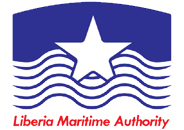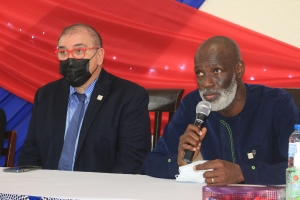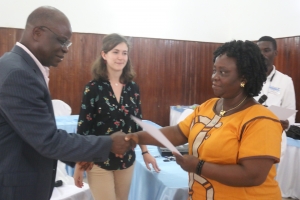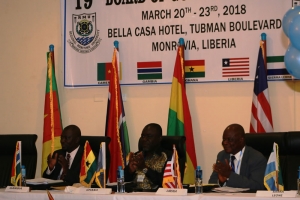Samuka Kanneh
The Liberia Maritime Program – an Abridged History
August 16, 2021By Gola Traub
Telling a long, serpentine but successful story in an abridged form tends to prove challenging, intimidating, if not plainly impossible. This piece, however, attempts to do just that – narrate Liberia’s maritime story in a truncated form – a brief history that covers the evolution of the Liberia Open Registry from 1948 to 2011. (2012 up to 2019 – and the “best way forward” will be tackled in the next edition of the Marine Monitor.)
Liberia is the second largest shipping registry in the world, renowned for its first class service delivery in the maritime industry but the country still lags behind in ensuring that Liberians are competitive in the maritime labor market as seafarers especially on vessels flying the country’s flag. The Commissioner of the Liberia Maritime Authority (LiMA) Lenn Eugene Nagbe says his time at the Authority would mark a defining moment in ensuring that Liberians’ capacity is built to give them a competitive edge in the maritime labor market giving the country’s position in the industry globally.
Speaking on the weekend of March 5, 2021 at the official reopening of the Liberia Maritime Training Institute (LMTI) in Marshall, Commissioner Nagbe said the Liberian Shipping Registry has been growing from strength to strength since its establishment in 1948 with great partnerships that has been pivotal in making the country’s registry the best and second largest in the global maritime industry.
Commissioner Nagbe indicated that despite the country’s strong position in the world maritime sphere, Liberians are yet to be given the opportunity to work on vessels around the world especially vessels that fly the Liberian flag primarily because Liberia, as a country, and the Liberia Maritime Authority have not developed the capacity of young people: we have not given them the training; we have not prepared them for service.
“This is why my administration, working with our partners and agents at Liscr, we have decided that in spite of the devastation of Covid-19, we could apply the right protocols in order to be able to reopen the LMTI so that we can give opportunities to this cohort of cadets, who once trained, certificated and accredited, would have the opportunity to earn a living by being in the maritime sector,” he stressed.
“The best way to deal with unemployment is to give capacity to our young people. That’s what the President [George Weah] has asked us to do,” he pointed out.
“Before, when there’s a ship at a port of Buchanan that encounters any problem like a propeller issue, they will have to send for someone in Amsterdam to come and untangle, but today, a group of Liberians have been trained and certificated by LMA to perform said function,” Commissioner Nagbe said.
The Liberia Maritime Authority Chief Executive Officer applauded the United States Government for the cooperation Liberia continues to enjoy strong and historic relationship.
He disclosed that Liberia has been removed from the list of countries not taking effective anti-terrorism measures by the United States Coast Guard. “This is just a beginning. My administration, working with our agent will have to do more and have decided to conduct an International Maritime Organization (IMO) Audit,” Commissioner Nagbe intimated.
According to him, the delisting of Liberia from the US States Coast Guard’s list of countries not having effective anti-terrorism measures would come handy in the cost of shipping that will directly affect the economy greatly. He said this is so because a Liberian shipping a vehicle from the United States to Liberia would pay three times than the cost of shipping that same vehicle from the same port to the Port Conakry, Guinea due to high insurance premium giving the country’s status then as high risk terrorism hotspot. “If we do not meet these international benchmarks, our commerce will continue to suffer because these variables have direct impact on the lives and livelihood of the people because it would cost us to pay higher prices for goods that come into our ports,” Commissioner Nagbe emphasized.
The United States Advisory Notice 2-20 says “on May 2, 2005 the Coast Guard published a Notice in the Federal Register, (70 FR 22668), announcing that it had determined that effective anti-terrorism measures were not in place in the ports of the Republic of Liberia. Accordingly, conditions of entry were imposed on vessels that visited the Republic of Liberia in their last five port calls. Based on recent assessments conducted in 2018, the Coast Guard has determined that the Republic of Liberia is maintaining effective anti-terrorism measures, and is accordingly removing the conditions of entry announced in the previously published Notice.
He noted that efforts are also being made with the National Fisheries and Aquaculture Authority to stamp out illegal fishing in Liberia’s waters adding that steps are also being taken to get Liberia off the European Union’s Yellow List when all the outstanding policy issues are addressed.
Also in remarks at the LMTI reopening ceremony, President George M. Weah said “cadets, you are our torchbearers and we will do our best to pave the way for you to succeed in your marine career path in our country. We will do our best to ensure that you put us on the map of global maritime professionals. Let me admonish you not to take anything for granted. In that way, you will not only make Liberia proud when you go out, you will also be contributing immensely to the rebuilding of your country.
“The continuous operation of this institute is essential in the building of our country as a maritime nation. To date, it remains the first place of exposure for Liberians interested in maritime studies,” President Weah said.
“Amid the closure of the institution because of the coronavirus, we still have all of the equipment set and ready for use. This is good for us. We have state-of-the-art equipment of the 21st century and it’s important for you as students to take advantage of it, especially the technology here,” the Liberian leader maintained.
According to President Weah, the 24 cadets who graduated in 2019 are doing very well at their various places of work after receiving gainful employment.
President Weah urged the 24 cadets to appreciate the opportunity provided them in studying and coming out with the best results on time. The students are expected to graduate in less than a year, according to President Weah.
Abraham Avi Zaidenberg, Chairman of the Liberia Maritime Training Institute (LMTI), for his part, intoned that the school during the early stage of the Covid-19 outbreak when movements were restricted and students were allowed to go home to be with their families.
Ever since the last visit of President George Manneh Weah in 2019 to witness the graduation of the first batch of 24 cadets, Mr. Zaidenberg said the graduates have taken up jobs in maritime sector with some being employed at d’Amico in Morocco; others are employed by Dutch concessionaire, APM Terminals while the rest have gone to the continue their studies at the Regional Maritime University (RMU) in Ghana.
He disclosed that LMTI has introduced short term courses for seafarers in the local maritime industry to build their capacities. The LISCR Boss lauded President Weah for the support and promised to continue to work hard in order to bring out the best in the cadets.
LiMA, Partners Hold Incident Management Workshop
April 26, 2019The Liberia Maritime Authority in collaboration with Global Initiative for West, Central and Southern Africa (GI WACAF) and the International Maritime Organization (IMO), will conduct a four-day national training workshop on Incident Management System (IMS) within the framework of GI WACAF. The event begins on 29 April 2019 and ends on 2 May 2019.
Liberia Maritime Clarifies US Coast Guard Advisory Note
February 01, 2019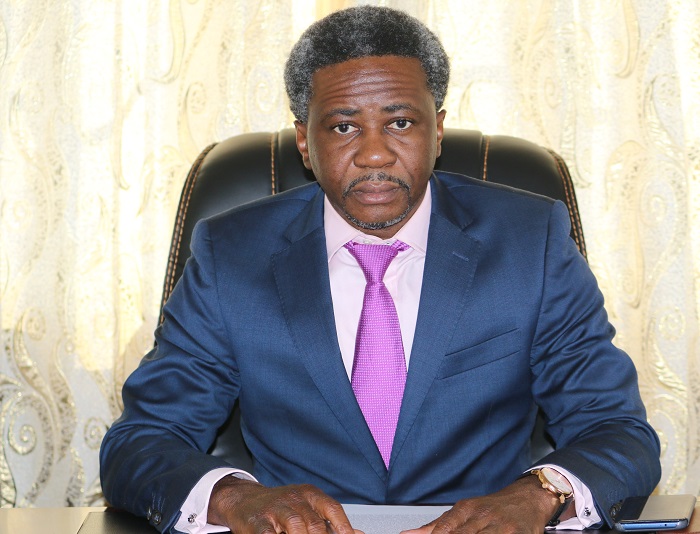
The Liberia Maritime Authority (LiMA) has said that the Advisory given to the US Coast Guard by the US Department of Homeland Security regarding restrictions of vessels entering US waters from certain ports in several countries, including Liberia, is not a downgrade of Liberia’s port operations.
LiMA clarified that the October 15, 2018 Advisory only relate to compliance with the International Ship and Port Facility Security (ISPS) Code issued by IMO in 2002, which became effective in 2004.
Safety, Inspection, Survey & Audit
January 31, 2019In ensuring compliance with various applicable Liberia Maritime laws and regulations as well as internationally accepted maritime safety, pollution prevention, security and labor instruments, the functions of this Department span port, flag and coastal State obligations.
Under Port State activities, SISA oversees Port State control (PSC) - the inspection of all foreign flagged vessels calling into Liberian seaports. In addition, s part of its port state control obligations aimed at deterring sub-standard shipping in the region, it liaises with and reports to the Secretariat of the Memorandum of Understanding on Port State Control for West and Central African Region (Abuja MoU).
There are specific flag State responsibilities and obligations performed by this Department. Similar to what LISCR, which administers the Liberian Registry, does for the inspection and audit of vessels and ship management companies under international program, SISA carries out the survey/inspection and audit of all domestic watercrafts and maritime-related companies registered under the Domestic Watercraft Law. It cooperates with other relevant departments and national stakeholders to investigate marine accidents and mishaps. The Department also supports LISCR with the transshipment program by liaising with the National Fisheries and Aquaculture of Liberia (NaFAA), to monitor Liberian-flagged vessels (including reefer, bunker and supply vessels) registered under the international program and engaged in or that plan to be involved in transshipment activities in certain sea areas or of specific species of fish managed by Regional Fisheries Management Organization (RFMOs) worldwide.
SISA is also tasked with the authority to ensure national compliance with key coastal State obligations and responsibilities – the provision and management of aids to navigation (AtoNs), maritime safety information (MSI) and hydrographic services – with a view to enhance safety of navigation in Liberia’s coastal waters.
As part of its responsibilities to implement and enforce relevant national and international maritime laws and conventions, the Department develops policies and plans with the view to promote maritime safety and the protection of the broader marine environment.
......
Maritime Commissioner Dr. James F. Kollie becomes new Board Chair
The 19th Meeting of the Board of Governors of the Regional Maritime University based in Accra, Ghana took place in Monrovia from March 20th to 23rd, 2018 at the Bella Cassa Hotel.
The Liberian Permanent Mission
May 24, 2018The Liberian Permanent Mission to the International Maritime Organization (IMO) is the technical and diplomatic arm of the Liberia Maritime Program. It coordinates all the Government of Liberia maritime related activities between Monrovia, the capital and London. Primarily, it ensures Liberia’s active participation in all IMO meetings and deliberations to promote and protect the national maritime interests. It ensures at all times the national maritime policies are aligned with the international instruments and regulations adopted by IMO. The branding of the Country’s maritime image abroad is a key component of its functions.
IMO, as the Specialized Agency of the UN Common System responsible for regulating global maritime transport standards, it conducts its statutory mandate (in terms of professional and technical services) through a number of meetings, including the Assembly, Council, Committees and Sub-Committees.
In addition to these IMO meetings, the Mission also regularly represents Liberia at meetings of other maritime-related bodies such as the International Mobile Satellite Organization (IMSO); the International Oil Pollution Compensation Fund (IOPC); the London Convention 1972 (LC72) and London Protocol 1996 (LP96), the International Labour Organization (ILO) and the International Telecommunication Union (ITU).
“The PMR†was established in 1987 and is headed by a Permanent Representative.
Safety & Protection
May 10, 2018The Department of Maritime Security within the Liberia Maritime Authority is responsible to administer Maritime Security related affairs of the Authority. The Department comprises of the Maritime Intelligence and Investigation Unit (MIIU) and the Security Operatives Unit. The Maritime Security Department serves as the Authority's main strategic resource in combating, investigating and if necessary, prosecuting maritime-related crimes, offences and violations.
The Department carries out oversight through the use of an elite group of Maritime Agents/ Special Agents whose sole purpose is to establish, protect and preserve the national domain awareness initiatives, working alone or in collaboration with the Liberian Coast Guard, and other agencies, as is necessary. Likewise, the Department is also responsible to uphold the regulatory and security tenets of the national maritime domain and water-borne commerce, in keeping with the Liberian Maritime Law, Regulations and Policies.
Furthermore, the Department ensures the proper collection, processing, analysis and dissemination of critical data / information consistent with breaches of the Liberia Maritime Law, Regulations, Policies, and procedures, as well as all International Maritime Conventions, Protocols and Treaties to which the nation is a party. Some additional duties include ensuring the protection / security of senior maritime personnel, visiting VIP's, and high value maritime assets nationwide.
Within the new reform of the department as per the IMO Strategy for Enhancing Maritime Security within West and Central Africa and in keeping with the Code of Conduct and the ECOWAS Integrated Maritime Security Strategy, the Department shall also play a major role and be an intricate part of the development of National Maritime Security Strategies, National Maritime Security Policies and National Maritime Security Implementation Plans and Procedures.
In this process, they will be tasked to generate the implementation of appropriate national maritime security policies to safeguard maritime trade from all forms of unlawful acts; national legislation, industry best practices, documented processes and procedures, which together provide the security necessary for the safe and secure operation of port facilities and ships at all security levels; and national legislation which ensures effective protection of the national maritime domain to include the integration of maritime offshore monitoring, control and surveillance activities.
